Discover the Safety of Cuba: Insights for a Worry-Free Adventure
Is Cuba safe to travel? This is a question that often crosses the minds of travelers planning a visit to this enchanting Caribbean island. With its vibrant culture, stunning landscapes, and historical charm, Cuba promises an unforgettable experience. However, like any destination, understanding safety tips can make your journey smoother and more enjoyable. This guide is crafted to provide you with everything you need to know to explore Cuba safely, ensuring peace of mind while immersing yourself in its wonders.
Table of Contents
Is Cuba Safe to Travel?
Cuba is recognized as one of the safest countries in the Caribbean. With its low crime rates and strong governmental focus on safeguarding tourists, the island offers a reassuring environment for travelers. While no destination is completely without risks, Cuba’s reputation for safety makes it a standout choice among Caribbean nations.
Key Safety Factors in Cuba
Low Violent Crime Rates
Cuba boasts one of the lowest violent crime rates in the region. Crimes against tourists are particularly rare, as the Cuban government prioritizes maintaining a positive international image. Most visitors experience trouble-free trips.
Strong Governmental Focus on Tourism
Tourism plays a significant role in Cuba’s economy, driving the government to enforce strict measures that protect visitors. The presence of police in tourist-heavy areas further reinforces a sense of security.
Petty Theft Precautions
Although Cuba is safe overall, petty crimes like pickpocketing and bag snatching can occur in crowded places such as markets or busy streets. Travelers should take precautions to protect their possessions and refrain from showing valuables in public.
Tips for Staying Safe in Cuba
- Stay in Licensed Accommodations: Opt for official hotels or licensed private homes (known as “casas particulares”) to ensure safety and quality service.
- Avoid Flashing Valuables: Keeping valuables like jewelry and electronics out of sight can reduce the risk of theft.
- Be Cautious at Night: While Cuba is safe, it’s best to stick to well-lit and busy areas after dark.
- Use Trusted Transportation: Rely on official taxis or pre-arranged transport services for secure travel around the island.
- Stay Aware in Crowds: Exercise extra caution in bustling areas, especially tourist hotspots like Havana’s Old Town or Trinidad.
By following these simple precautions and staying mindful, you can enjoy everything Cuba has to offer with peace of mind. Its friendly locals, vibrant culture, and historical charm make it an unforgettable destination for all travelers.
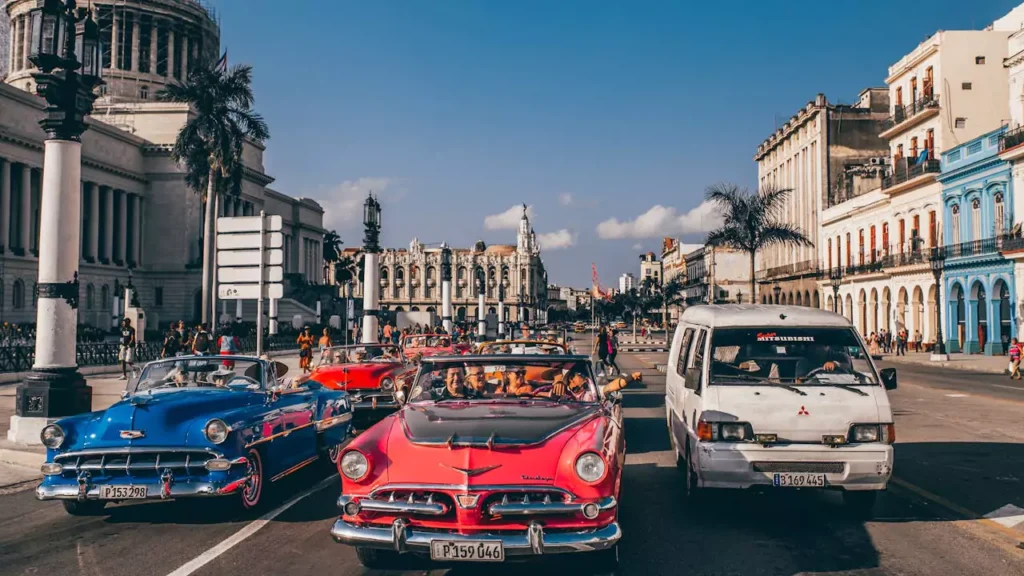
Understanding the Local Environment
Cuba offers a unique blend of cultural richness, political stability, and local warmth, creating a welcoming environment for tourists. By understanding the local dynamics, visitors can navigate the country with confidence and enjoy an authentic experience.
Cultural Norms and Local Friendliness
The Cuban people are renowned for their warmth, friendliness, and welcoming nature. They are often eager to assist travelers, whether by providing directions, sharing cultural insights, or simply engaging in conversation. This openness contributes to Cuba’s reputation as a welcoming destination.
To foster positive interactions and deepen your connection with locals:
- Respect Cultural Traditions: Cubans value their heritage, so showing interest in their culture, customs, and cuisine is appreciated.
- Learn Basic Spanish Phrases: While many Cubans in tourist areas speak some English, attempting to communicate in Spanish demonstrates respect and builds rapport.
- Dress Modestly: In religious or rural settings, modest attire is advisable to show cultural sensitivity.
Embracing these norms allows you to create meaningful connections and enjoy a richer travel experience.
Political Stability and Tourist Safety
Cuba’s political landscape is characterized by stability, which contributes to a secure environment for visitors. While certain issues might appear in international media, they rarely impact tourists. The government places a high priority on ensuring the safety and satisfaction of foreign visitors, given tourism’s crucial role in the national economy.
Key considerations for navigating political topics in Cuba:
- Avoid Political Discussions: While Cubans are generally open to sharing their perspectives, engaging in political debates can lead to misunderstandings. It’s best to focus on cultural and social topics instead.
- Stay Informed: Make sure to understand local laws and customs to prevent any accidental violations.
- Follow Local Guidelines: Adhering to rules regarding photography (especially in government or military areas) and behavior in public spaces ensures a smooth experience.
Understanding and respecting Cuba’s cultural and political environment helps ensure a safe, enriching, and immersive visit.
Common Safety Concerns for Tourists in Cuba
While Cuba is a safe destination overall, being aware of potential risks and challenges allows visitors to take the necessary precautions and enjoy a worry-free trip.
Petty Crimes
Petty crimes, though infrequent, can occur in crowded areas or tourist hotspots. Staying vigilant is key to avoiding these situations.
- Pickpocketing: This is more likely in crowded markets, busy streets, or on public transportation. To minimize risk, keep valuables in a secure location, such as a money belt, and avoid displaying expensive items like jewelry or smartphones.
- Bag Snatching: Thieves may target bags left unattended or loosely carried. Opt for a cross-body bag with zippers and keep it positioned in front of you.
Travel Scams
Some scams target tourists, especially in popular tourist areas. Understanding these risks can help you avoid falling victim.
- Overpriced Taxis: Some drivers may attempt to overcharge unsuspecting tourists. Always agree on a fare before starting the ride or use government-authorized taxis, which are safer and more reliable.
- Counterfeit Souvenirs: In some destinations, counterfeit items such as handicrafts, jewelry, or traditional products are sold to tourists. To ensure authenticity and quality, purchase souvenirs from reputable stores or certified vendors.
Health Concerns
Health issues can arise if travelers are not cautious about water quality and exposure to insect-borne illnesses.
- Water Safety: Tap water in Cuba is not safe for drinking. Stick to bottled or boiled water for drinking and brushing teeth. Avoid ice cubes in drinks unless you’re sure they are made from purified water.
- Mosquito-Borne Illnesses: Insects can carry diseases such as dengue or Zika. Protect yourself by using insect repellent, wearing long sleeves and pants in rural or forested areas, and sleeping under mosquito nets when necessary.
Additional Tips for Safe Travel in Cuba
- Emergency Numbers: Be aware of emergency contact numbers for police, medical services, and your country’s embassy.
- Travel Insurance: Make sure you have comprehensive travel insurance that includes coverage for medical emergencies, theft, and cancellations.
- Local Advice: Listen to advice from your hosts or local guides, as they can provide insights into current safety conditions.
By staying informed and prepared, you can navigate Cuba confidently and make the most of your trip to this beautiful island nation.
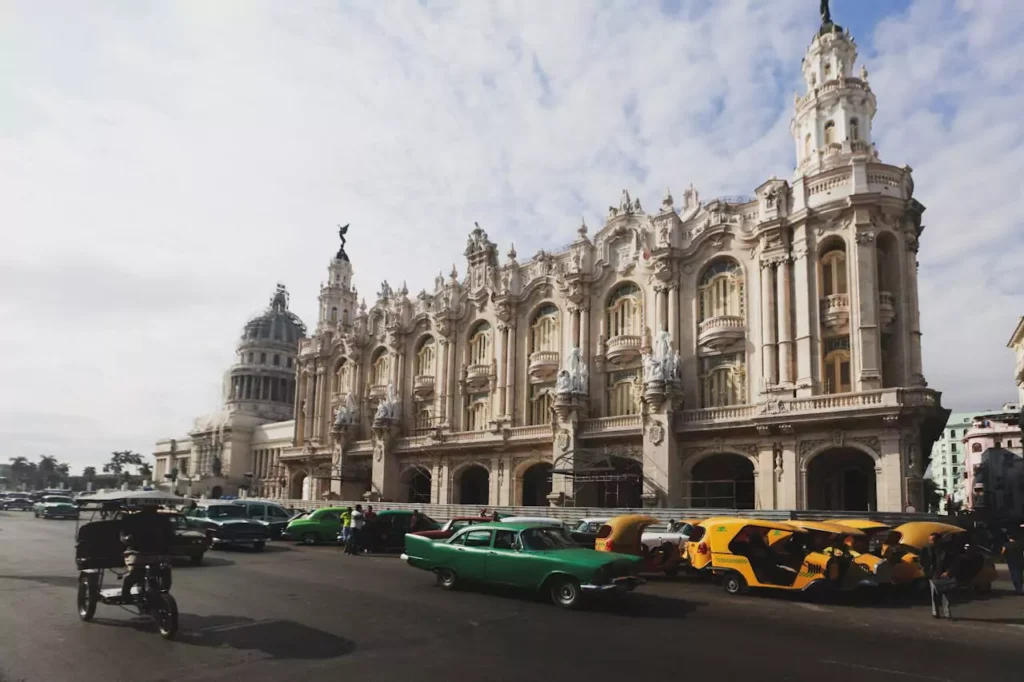
Navigating Cuba Safely: Travel Tips
To make the most of your trip to Cuba, understanding how to navigate transportation and accommodation options safely is essential. Here are some helpful suggestions to guarantee a safe and enjoyable experience.
Transportation Tips
Cuba offers a variety of transportation methods, each with its own advantages and considerations.
- Taxis:
Opt for government-authorized taxis, which are easily identifiable by their yellow or white color and official markings. Always negotiate the fare beforehand or ensure the taxi meter is running to avoid unexpected charges. Be cautious when taking unlicensed or unofficial taxis. - Rental Cars:
Renting a car allows you to explore Cuba at your own pace. However, take note of the following:- Roads may be poorly lit or uneven, especially in rural areas, so avoid driving at night.
- Ensure the car rental includes insurance and carefully inspect the vehicle for any existing damage before taking it.
- Public Transport:
While public buses (known as “guaguas”) are an affordable option, they are often crowded and less reliable for tourists. Consider using tourist-focused bus services like “Viazul,” which are more comfortable and tailored for travelers.
Accommodation Safety
Choosing safe and comfortable accommodations is vital for a worry-free stay.
- Casas Particulares:
These licensed, privately-owned guesthouses provide a safe and authentic Cuban experience. Look for casas with official signage (a blue anchor symbol) to ensure they meet government standards. Staying in a casa particular is also a great way to interact with locals and gain cultural insights. - Hotels:
Most hotels in Cuba, especially those in tourist areas, have adequate security measures. While they are typically more expensive than guesthouses, they may offer additional amenities like pools and restaurants. Choose hotels with good reviews and convenient locations for added peace of mind. - Advance Booking:
Book your accommodations in advance to avoid last-minute stress and guarantee availability. This is particularly important during peak tourist seasons when demand is high.
Additional Tips for Navigating Cuba
- Stay Connected: While internet access in Cuba is limited, you can purchase an ETECSA internet card for use in public Wi-Fi hotspots. This helps you stay connected for navigation and communication.
- Carry Cash: Credit cards issued by U.S. banks may not work in Cuba. Carry cash (preferably Euros or Canadian dollars) and exchange it at official exchange offices or banks.
- Travel Apps: Download offline maps and translation apps before your trip to help with navigation and communication.
Planning ahead and staying informed ensures a safe journey around Cuba, allowing you to enjoy all that this vibrant island has to offer.
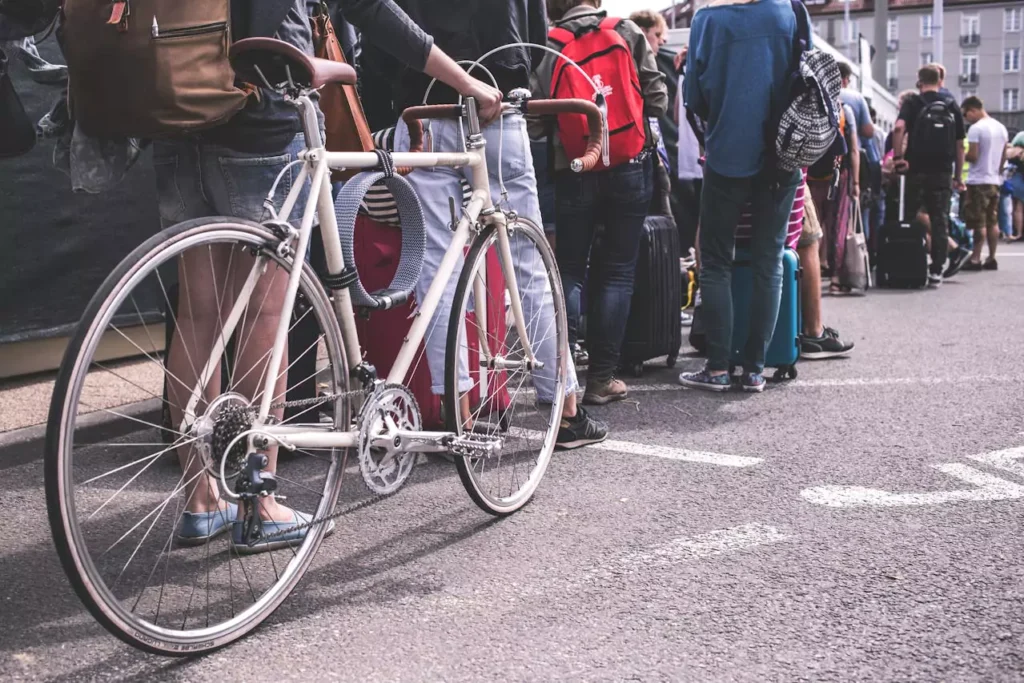
Essential Packing Tips for a Secure Trip
Packing thoughtfully for your trip to Cuba not only ensures convenience but also enhances your safety and preparedness. Here’s a guide to the essentials you should include to make your journey smooth and worry-free.
Must-Have Items
- Anti-Theft Gear:
Invest in items designed to keep your belongings secure:- Money belts or neck pouches to keep cash and important documents hidden.
- RFID-blocking wallets to protect against digital theft of your credit card information.
- Anti-theft backpacks with lockable zippers and slash-resistant straps for peace of mind in crowded areas.
- Important Documents:
- Carry photocopies of your passport, visa, and travel insurance policy in case the originals are lost or stolen.
- Keep digital copies of these documents stored securely online or on your device for backup.
- First-Aid Kit:
A compact first-aid kit can be a lifesaver in case of minor injuries or illnesses. Include:- Bandages, adhesive tape, and antiseptic wipes.
- Pain relievers, antacids, and any prescribed medications you regularly take.
- Sunscreen and aloe vera for sunburns, as well as anti-diarrheal medicine in case of digestive issues.
Additional Essentials
- Reusable Water Bottle:
Stay hydrated while reducing your environmental footprint. Consider a water bottle with a built-in filter for added convenience and safety. - Bug Spray:
Mosquitoes are common, especially in rural or humid areas. Choose a repellent with DEET or natural alternatives like citronella to keep bites at bay. - Power Adapter:
Cuba uses 110V and 220V with American-style plugs (Type A) and European-style plugs (Type C). Bring a universal adapter to ensure your electronics stay charged. - Comfortable Clothing:
Pack lightweight, breathable clothing for the tropical climate. Include a light jacket for cooler evenings and sturdy shoes for walking tours. - Snacks and Toiletries:
Some items, like snacks or specific toiletries, may not be readily available in Cuba. Bring travel-sized toiletries and your favorite non-perishable snacks for convenience.
Packing Tips for a Hassle-Free Experience
- Travel Light: Stick to essentials to make moving around easier, especially if you plan to use public transport.
- Separate Valuables: Distribute cash and cards in different places to minimize risk in case of theft.
- Pack for the Weather: Cuba’s tropical climate calls for sunscreen, sunglasses, and a hat to protect against the sun.
Packing smartly ensures you’re well-prepared for your Cuban adventure, allowing you to focus on enjoying the island’s unique charm and culture.
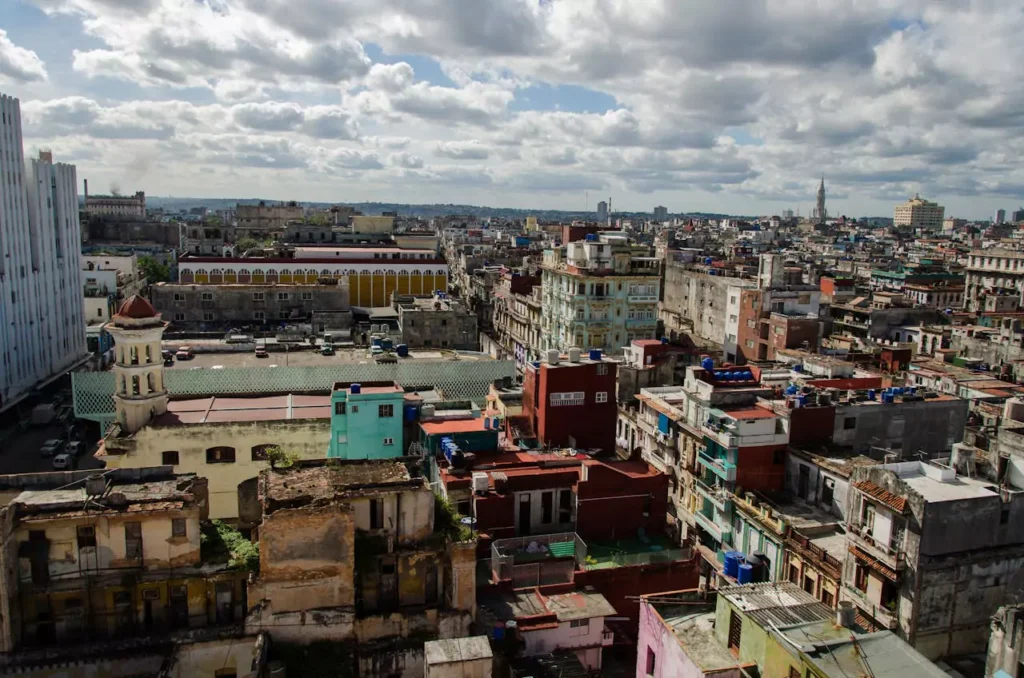
Health and Safety Tips While Exploring Cuba
Staying healthy and safe while exploring Cuba ensures you can fully enjoy its vibrant culture, stunning landscapes, and rich history. Follow these essential tips to safeguard your well-being during your trip.
Food and Water Safety
- Choose Wisely:
When dining out, opt for reputable restaurants or those recommended by locals or fellow travelers. Well-established venues are more likely to adhere to proper hygiene standards. - Street Food:
Cuban street food is an integral part of the culinary experience. However, prioritize vendors with high turnover and ensure that food is freshly prepared and thoroughly cooked. Avoid raw or undercooked dishes to minimize the risk of foodborne illnesses. - Water Precautions:
Tap water in Cuba is not potable. Stick to bottled water, which is widely available, and verify that the seal is intact before drinking. Avoid ice cubes unless you’re certain they are made from purified or bottled water. Similarly, brush your teeth with bottled water for extra precaution.
Staying Healthy on the Island
- Sun Protection:
Cuba’s tropical climate means plenty of sunshine, so protect yourself from sunburn and heatstroke:- Apply broad-spectrum sunscreen with a high SPF frequently, especially after swimming or sweating.
- Wear a wide-brimmed hat and lightweight, long-sleeved clothing to shield your skin.
- Stay hydrated by drinking plenty of water throughout the day.
- Travel Insurance:
Comprehensive travel insurance is essential for covering unexpected medical expenses or emergencies. Verify that your insurance includes coverage for hospital stays, evacuation, and medical treatment abroad. Cuban authorities may ask for proof of travel insurance upon arrival.
Additional Health Tips
- Avoid Mosquito Bites: Protect against mosquito-borne illnesses like dengue by using insect repellent, wearing protective clothing, and sleeping under mosquito nets if necessary.
- Be Prepared for Emergencies: Familiarize yourself with the location of nearby hospitals or clinics in case of illness or injury.
- Stay Active Safely: When participating in activities like hiking or swimming, follow safety guidelines and be aware of your surroundings.
By taking these precautions, you can explore Cuba with confidence, knowing you’ve prioritized your health and safety while enjoying the island’s many attractions.
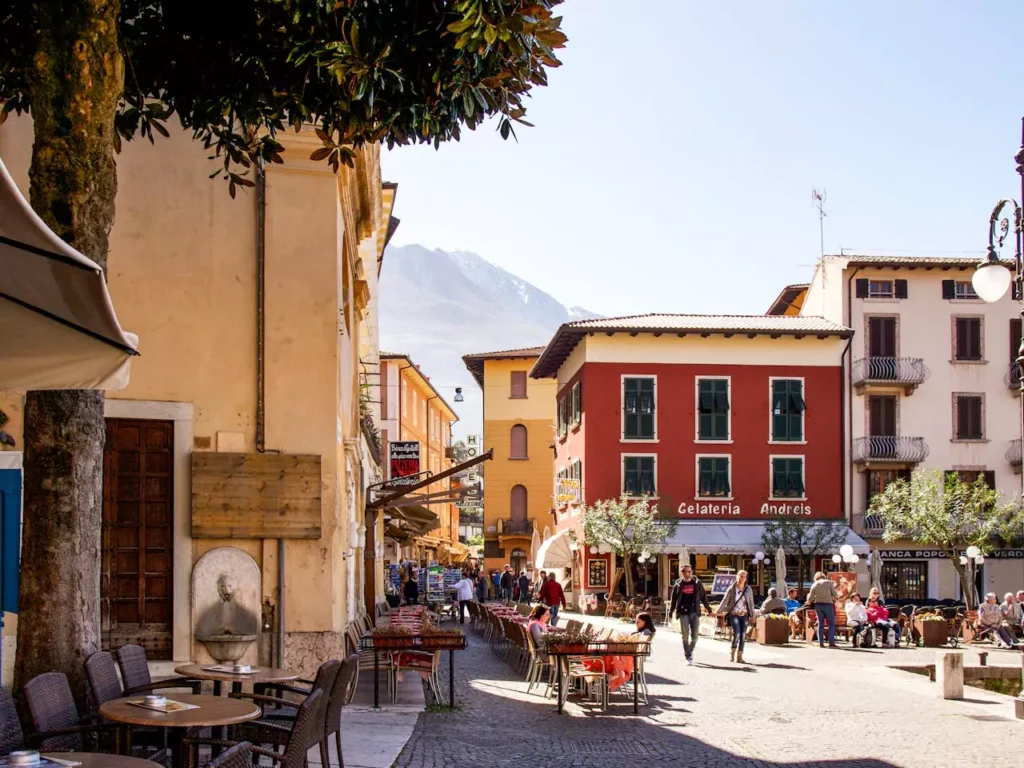
Solo vs. Group Travel: What to Know
Whether you’re traveling solo or with a group, Cuba offers unique experiences for both. Each option has its own benefits, and understanding what suits your travel style and preferences will help ensure a memorable and safe trip.
Solo Travelers
Cuba is a fantastic destination for solo travelers, offering a safe environment, friendly locals, and plenty of cultural experiences to enjoy independently. However, as with any solo adventure, taking a few extra precautions will ensure your safety and peace of mind.
- Stick to Well-Populated Areas:
Solo travelers should focus on well-lit, busy areas, especially after dark. Avoid wandering through unfamiliar neighborhoods alone at night. Areas like Havana’s Old Town or the Varadero beach strip are generally safe and bustling with activity. - Inform Someone of Your Itinerary:
Always share your travel plans with a family member, friend, or fellow traveler. Regular check-ins through text or social media are important for staying in touch and ensuring someone knows your whereabouts. - Stay Aware of Your Surroundings:
Be mindful of your belongings, particularly in crowded tourist spots. Avoid displaying expensive items and keep valuables in secure, anti-theft bags or money belts.
Group Travelers
Traveling in a group provides the advantage of shared experiences and enhanced security. Cuba is an ideal destination for group trips, where collective strength can offer both comfort and safety.
- Shared Experiences:
Traveling in a group allows you to explore the country’s diverse landscapes, cities, and culture with companions. Whether it’s hiking in Viñales or enjoying a group tour through Havana, shared experiences can make the trip more memorable. - Greater Security:
Group travel provides an added layer of safety. There’s strength in numbers, which can deter potential scammers or thieves. You can also navigate unfamiliar areas more confidently, knowing there are others to help with decision-making or when faced with language barriers. - Reduced Risk of Being Targeted by Scams:
While solo travelers might be more vulnerable to scams, group travelers are less likely to be targeted by touts or overcharged by taxis or vendors. Group dynamics often discourage opportunistic behavior aimed at tourists.
Choosing the Best Option
Both solo and group travel in Cuba offer unique advantages:
- Solo travelers will enjoy the freedom to explore Cuba at their own pace, meet new people, and immerse themselves in local culture with minimal distractions.
- Group travelers will benefit from companionship, shared responsibilities, and additional security, making group travel a great choice for first-time visitors or those who prefer a more guided experience.
Whether you choose to travel solo or in a group, Cuba is a welcoming destination with plenty to offer.
What to Do in Case of Emergencies in Cuba
While Cuba is a relatively safe destination for tourists, it’s always best to be prepared in case of unexpected situations. Knowing what to do in emergencies ensures that you’re equipped to handle any challenges that may arise during your trip.
Emergency Contacts
- Police:
In case of an emergency, dial 106 for police assistance. This number can be used for reporting theft, accidents, or any other urgent situations requiring law enforcement intervention. - Medical Assistance:
Cuba has a well-established healthcare system, and there are international clinics in major cities like Havana and Varadero. If you experience a medical emergency, head to the nearest hospital or clinic. If you’re staying at a hotel, the staff can assist you in arranging medical care. - Embassies:
It’s a good idea to register with your country’s embassy upon arrival for updates on local events or advisories. In case of an emergency, the embassy can offer assistance in situations such as lost passports or natural disasters.
Handling Unexpected Situations
- Lost Passport:
If your passport is lost, immediately report it to the local police and get a police report. Afterward, reach out to your embassy to request a replacement passport. Embassies often require a police report to process the replacement. - Theft:
In case of theft, file a report with the authorities to document the incident. Be sure to inform your travel insurance provider, as many policies cover losses from theft. Keep a copy of the police report for insurance purposes.
Additional Emergency Tips
- Emergency Numbers: Write down or save emergency numbers (like the local police, ambulance, and embassy) in your phone for quick access.
- Health Insurance: Make sure you have adequate health insurance that covers medical treatment abroad. Cuba requires tourists to have health insurance, which is often included with flight bookings, but confirm this before traveling.
- Stay Calm and Follow Protocol: In any emergency, staying calm and following the necessary steps will help you resolve the situation more effectively.
Staying prepared and knowing the right steps to take helps you manage any unexpected situations that may arise during your time in Cuba, allowing you to enjoy your trip with confidence.
Enjoy a Secure and Memorable Cuban Adventure
Cuba’s charm lies in its rich culture, stunning scenery, and warm hospitality. By following these tips and staying informed, you can enjoy a safe and enriching journey. Whether you’re strolling through Havana’s historic streets or relaxing on Varadero’s pristine beaches, Cuba offers a treasure trove of experiences waiting to be discovered. So pack your bags, embark on the adventure, and make memories that will stay with you forever.
Call to Action: Ready to explore Cuba? Start planning your trip today and experience the magic of this captivating island for yourself.

